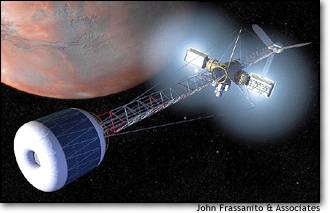 |  |
 |
| � | � | WASHINGTON, July 14 — �Setting foot on Mars, returning humans to the moon to stay, sending robotic scouts beyond the solar system, harnessing the sun’s energy and harvesting the mineral abundance of asteroids are all space missions that should be within humanity’s reach over the next century. | � |
| � | � |
|
� |
|
| � | ||||||||||||||||||||||||||||||||||||||||||||||||||||||||||||||||
|
� � � �WHILE FASCINATION with space is as old as the first starry night,
humanity’s first half-steps into outer space occurred only 46 years ago this
October when a Soviet rocket punched through the clouds and put the first
artificial satellite in orbit. Many thousands of satellites have since followed
Sputnik into orbit, the vast majority of them used for communications and
keeping tabs on what’s happening down below. A smaller number have broken
free of Earth’s orbit and sent back often-stunning picture postcards of some
of the other inhabitants in this corner of the galaxy. � � � �People, too, have made the voyage to space, some staying for hours, some for more than a year, and some have even made it as far as the moon. How far humanity expands its presence in the solar system and takes full advantage of space to solve pressing problems here on Earth will depend on technical innovations, political trends and world events — phenomena that often defy accurate prediction. � � � � PACE OF SPACEFLIGHT |
|||||||||||||||||||||||||||||||||||||||||||||||||||||||||||||||
|
� � � �As busy as the first half-century of spaceflight has been, it has
not advanced at the same rapid pace as aviation did in the first half of
the 20th century. Fifty years after Orville and Wilbur Wright achieved the
first controlled, powered flight at Kitty Hawk, N.C., on Dec. 17, 1903, aircraft
had already transformed military combat and provided routine, affordable
commercial jet travel for a newly mobile population. � � � �Thirty years after the last manned mission to the moon, human spaceflight remains the sole province of governments, including the recent journeys of two well-heeled businessmen aboard Soviet-era spacecraft to a taxpayer-funded space station. � � � �“For the past 50 years, everyday people have thought they would be able to go into space within the next 10 to 20 years,” said Tony De Tora, executive director of the Space Frontier Foundation. “And for 50 years, people have been wrong.” � � � �De Tora said the present gives him little reason to be optimistic that humankind will have done much 20 years from now to expand its presence in the solar system. Looking out beyond his lifetime, however, he dares to dream a little bigger. � � � �“One hundred years from now, I think we will have seen the first children born in space,” he said. “I think we will have colonies on both the moon and Mars, and I expect to see some sort of mining operation dealing with asteroids, as well as a much larger scientific exploration regime to the outer solar system.” � � � �Brian Chase, executive director of the National Space Society here, also expressed confidence that humanity will move beyond Earth orbit within the next 100 years. But whether such milestones are accomplished toward the tail end of the coming century or sometime sooner, he said, depends in large part on actions taken in the years just ahead. � � � �Barring unforeseen developments, such as a breakthrough in propulsion technology or the discovery of a killer asteroid on a collision course with the Earth (nothing like impending disaster to bring creative ideas to the fore), Chase said, humankind’s exploration and exploitation of space is likely to plod along. � � � �Both Chase and De Tora were emphatic that reducing the cost of reaching orbit is the single most important controllable variable in forecasting the pace of space exploration and exploitation. � � � �“Without really tackling the space access problem, they happen in the latter part of the century,” Chase said. � � � � CAUSE FOR CONCERN � � � �If predicting the future is, as science fiction author William Gibson puts it, “mostly a matter of managing not to blink as you witness the present,” there is some cause for concern. � � � �NASA, which spends more on space than all other space agencies combined, has throttled back in the past year on efforts to lower launch costs in order to concentrate on an Orbital Space Plane. � � � �“We’ve failed miserably in the last 20 years in trying to fix this problem,” Chase said. “Obviously we have to move beyond the space shuttle. We have failed time and time again to develop new launch systems.” |
|||||||||||||||||||||||||||||||||||||||||||||||||||||||||||||||
� � � �“It’s a much harder problem,” Martin said. “And it takes a lot of resources to do it. If it was cheap we could be doing it over and over again and try numerous approaches. Look at the early airplanes, with many, many people trying out their designs, and you saw how many didn’t work.” � � � �Martin said that NASA is attempting to invest in those technologies needed for humanity to expand its understanding and mastery of space, from establishing human outposts well beyond Earth orbit to sending interstellar probes to explore beyond the solar system. In that regard, NASA is getting started now on nuclear propulsion, radiation countermeasures and advanced communications not only to shorten the travel times to distant places, but also to bring along enough power to do meaningful science once there, Martin said. � � � �Others like space entrepreneur Charles Chafer said science is only part of what will drive humans beyond Earth orbit. Human nature, along with the desire to not merely survive but to thrive and make a buck, will in due time drive humankind to move on to the moon, Mars and beyond, Chafer said. � � � �“If we get a second toehold in the solar system in the next 100 years, we will have gone a long ways toward ensuring the long-term viability of the human species,” Chafer said. � � � � IMPROVING LIFE ON EARTH |
||||||||||||||||||||||||||||||||||||||||||||||||||||||||||||||||

|
� � � �Even if humans remain a largely Earthbound species over the next 100
years — and few doubt that it will — space continues to hold tremendous promise
for improving life here on Earth. � � � �Molly Macauley, a senior fellow at Resources for the Future here, said satellites would play an increasingly critical role in managing the environment in the century to come and could even help address some of the planet’s most critical resource needs. � � � �Macauley, who is writing a white paper for the Organization for Economic Cooperation and Development examining the role of space in energy and environment in the next 50 years, said that even if humans push beyond Earth orbit, there is plenty that mastery of space has to offer those still bound to the home planet. � � � �“For energy and water quality, two of the largest issues in the decades ahead, space technology can play a very big role,” Macauley said. She said governments “have a way to go” to make space-based remote sensing an everyday part of environmental decision-making. And that, depending on the global economy, could even take some of the pressure off the world’s oil supply. � � � �“Some folks say it’s going to be business as usual for the next 50 years, other folks say we are going to run out of oil in the next five [years],” she said. “There could be a role for [space solar power] in the next 100 years and quite possibly sooner.” � � � � � � � �Brian Berger is a staff writer for the weekly Space News. � � � �� 2003 Space.com. All rights reserved. � � � � | |||||||||||||||||||||||||||||||||||||||||||||||||||||||||||||||
| � | ||||||||||||||||||||||||||||||||||||||||||||||||||||||||||||||||
| � | � | � | � | |||||||
| � | � |
  Space.com Space.com
|
� | |||||||
| � | � | � | |
|
|||||||||||||||||||
| � | � | ||||||||||||||||||
|
|||||||||||||||||||
| � | � | ||||||||||||||||||
| � | |||||||||||||||||||
| � |
|
||||||||||||||||||
| � | � | ||||||||||||||||||
| � |
|
||||||||||||||||||
| � | � | ||||||||||||||||||
|
|
Advertisement
|
|||||||
 Konica Revio C2 Digital Camera $199.95 Sale $169.95 B&H Photo-Video30 Anniversary Savings Storewide |
|||||||
|
|
|||||||
�
Space News
�
�
Technology & Science
�
�
MSNBC's Top News
�
�
















 �Predicting spaceflight's next century
�Predicting spaceflight's next century


